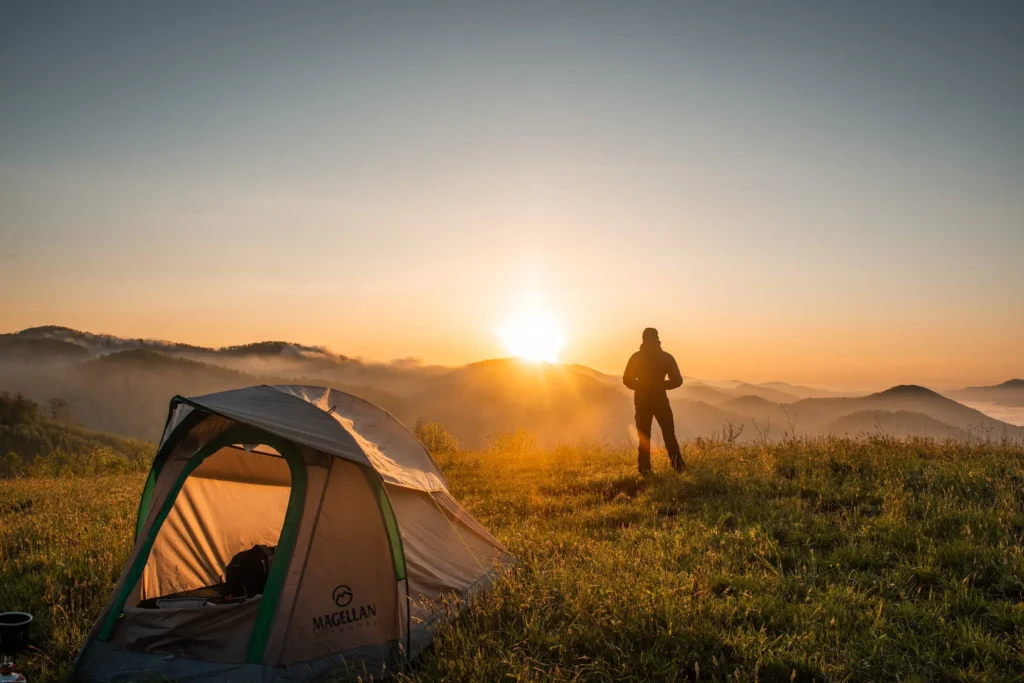Camping has always been a cherished outdoor activity, offering an escape into nature and a unique way to explore the beauty of our planet. However, like any adventure, it comes with its set of risks and challenges that can raise safety concerns.

Understanding these risks and how to mitigate them is essential for ensuring a safe and enjoyable camping experience.
Understanding Camping Risks
When embarking on a camping trip, various risks can impact your safety. These include wildlife encounters, unpredictable weather conditions, and potential injuries from outdoor activities. Being aware of these risks and preparing for them can significantly enhance your safety while camping.
Recent reports shed light on the popularity of camping and, implicitly, the risks involved. In 2022, camping saw a significant surge in popularity, with over 92 million American households identifying as campers and 58 million households camping at least once.
This surge, well ahead of pre-COVID-19 figures, included more than 6.4 million households camping for the first time. The demand for camping was so high that it became five times harder to find an available campsite compared to the pre-pandemic period, making 2022 the most booked-up year ever.
Ticks and Lyme Disease
Ticks are prevalent in many regions, including the US, Europe, and parts of Asia, posing a risk for Lyme disease—a condition transmitted through tick bites. When exploring nature or areas known for tick populations, it’s crucial to take precautions such as using repellents, wearing protective clothing, and performing tick checks after outdoor activities.
Cockroaches and Ants: Unwanted Companions
Cockroaches and ants can be encountered in various accommodations and climates, sometimes even in the cleanest environments. Keeping your area clean, storing food in sealed containers, and disposing of garbage regularly can help minimize encounters with these pests.
Rodents: A Global Issue
Rodents, including rats and mice, pose risks in both urban and rural camping areas by spreading diseases. Ensuring food sources are secure and accommodations are free from entry points can help keep your camping area rodent-free “Are Camping Trips Safe? Things to Know Before You Go Camping”
Safety Tips for Camping
- Proper Planning: Successful camping trips start with thorough planning. Research your destination, understand the weather conditions, and familiarize yourself with the local wildlife and any potential hazards. Ensure your route and activities are suitable for all members of your party and that you have obtained the necessary permits.
- Food Storage: Proper food storage is crucial to avoid attracting wildlife to your campsite. Use bear-proof containers when necessary and store all food, toiletries, and trash away from your sleeping area. Hanging food in trees away from your campsite can also be effective, especially in backcountry settings.
- Emergency Preparedness: Always carry a comprehensive first-aid kit and know how to use it. Learn basic first aid and CPR before your trip. Additionally, pack emergency supplies such as a whistle, flashlight, extra food, and water. Inform someone of your travel plans and expected return time.
- Awareness and Respect for Wildlife: Keep a safe distance from all wildlife and never feed them. Store food securely and dispose of waste properly to minimize your impact on the environment and its inhabitants.
Backyard Camping Basics
- Introduction to Backyard Camping: Backyard camping can be a great introduction to camping for beginners or a fun family activity. It offers the experience of camping with the convenience and safety of being close to home.
- Setting Up Your Campsite: Choose a flat, clear area in your backyard to set up your tent. Practice setting up the tent during the day to ensure you understand how to assemble it properly. At night, use lanterns, flashlights, or string lights to illuminate your campsite.
- Campfire Safety: If local regulations allow it and you have a fire pit, you can enjoy a campfire in your backyard. Always supervise the fire, keep a bucket of water or a hose nearby, and ensure the fire is completely extinguished before going to sleep or leaving it unattended.
- Activities: Backyard camping is an excellent opportunity for stargazing, storytelling, and playing outdoor games. It’s also a perfect time to try out camping recipes with a portable stove or grill. The simplicity of backyard camping allows you to focus on enjoying nature and spending quality time with family or friends.
Equipment Essentials
Whether you’re venturing into the wilderness or setting up a tent in your backyard, having the right equipment is crucial for both safety and comfort. Here’s a list of essential camping gear for both settings: “Are Camping Trips Safe? Things to Know Before You Go Camping”
- Tent: A sturdy tent suitable for the season and environment you’ll be camping in. Ensure it’s large enough for all campers and their gear.
- Sleeping Bag and Pad: Choose sleeping bags rated for the temperature you’ll encounter. A sleeping pad adds an extra layer of insulation and comfort.
- Lighting: Reliable flashlights, headlamps, and lanterns. Consider solar-powered or rechargeable options to reduce waste.
- Cooking Gear: A portable stove, cooking utensils, and food storage containers. Even in your backyard, mimicking the wilderness experience can be fun and educational.
- Water Filtration: For wilderness camping, a water filter or purification tablets are essential. In the backyard, have plenty of water bottles on hand.
- Clothing: Weather-appropriate clothing and extra layers for sudden temperature changes. Waterproof gear is a must for unpredictable weather.
Importance of Quality Equipment
Investing in quality equipment can prevent accidents and ensure a pleasant camping experience. High-quality gear is designed to withstand harsh conditions and provide reliable performance when you need it most. It’s an investment in your safety and enjoyment of the outdoors.
Preparing for Emergencies
Being prepared for emergencies is critical in both wilderness and backyard camping scenarios. Besides the basic first aid, think about these tips as well:
- Emergency Contact Information: Have a list of emergency contacts, including local authorities and park services.
- Navigation Tools: GPS devices, maps, and compasses are essential for wilderness camping. Familiarize yourself with your camping area even if it’s just your backyard.
- Well-Stocked First Aid Kit: Include items like bandages, antiseptic wipes, tweezers, scissors, and any personal medications.
Having a Plan
Developing an emergency plan is crucial. This includes understanding the nearest exit routes, having a meet-up point if you get separated, and knowing the location of the nearest medical facility. “Are Camping Trips Safe? Things to Know Before You Go Camping”
Endnote
Safety is paramount in ensuring a positive camping experience. By taking the necessary precautions and being prepared, you can enjoy the great outdoors with peace of mind.
Backyard camping is an excellent way to familiarize yourself and your family with camping basics before heading into the wilderness. It’s a safe, controlled environment to practice setting up equipment, cooking outdoors, and sleeping under the stars.
Embrace these adventures as opportunities to learn, grow, and create lasting memories with loved ones.
For More Info… Click Now
The post Are Camping Trips Safe? Things to Know Before You Go Camping appeared first on Travelstype.

